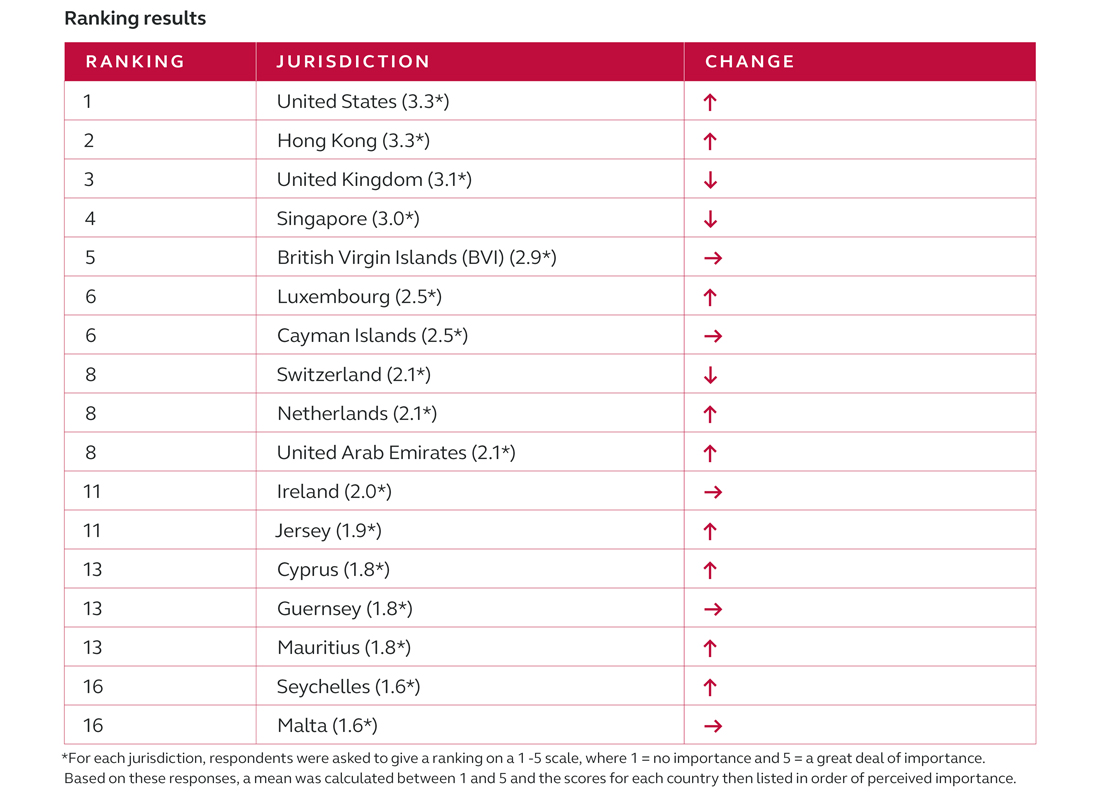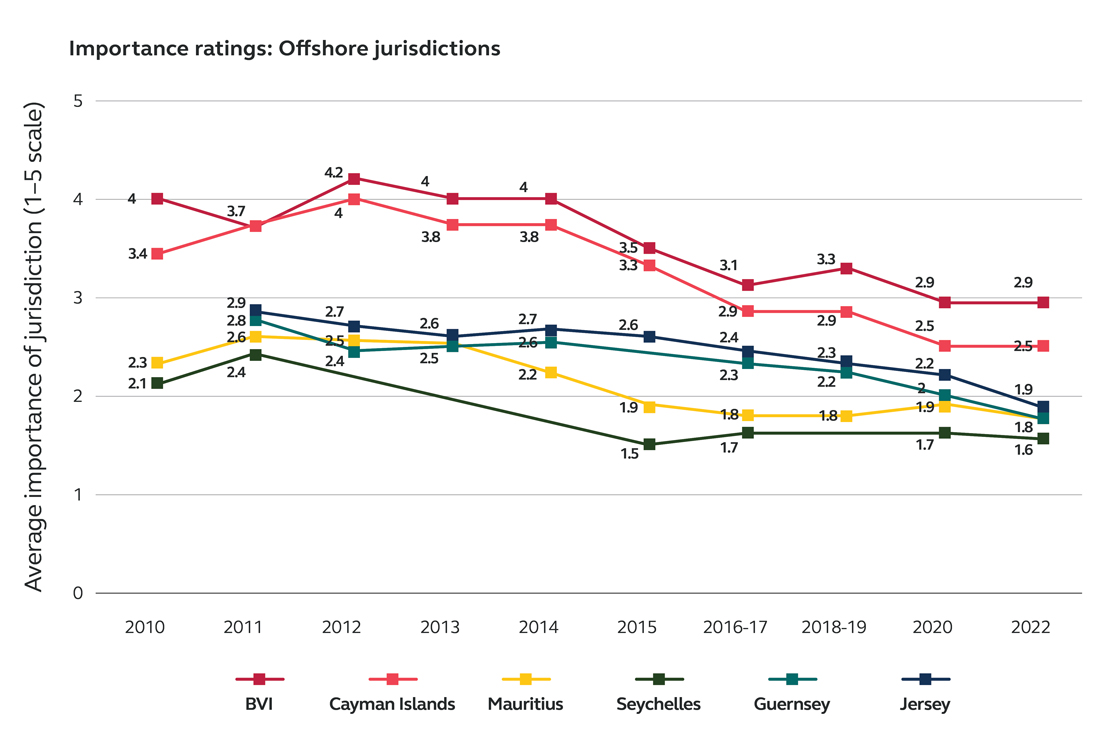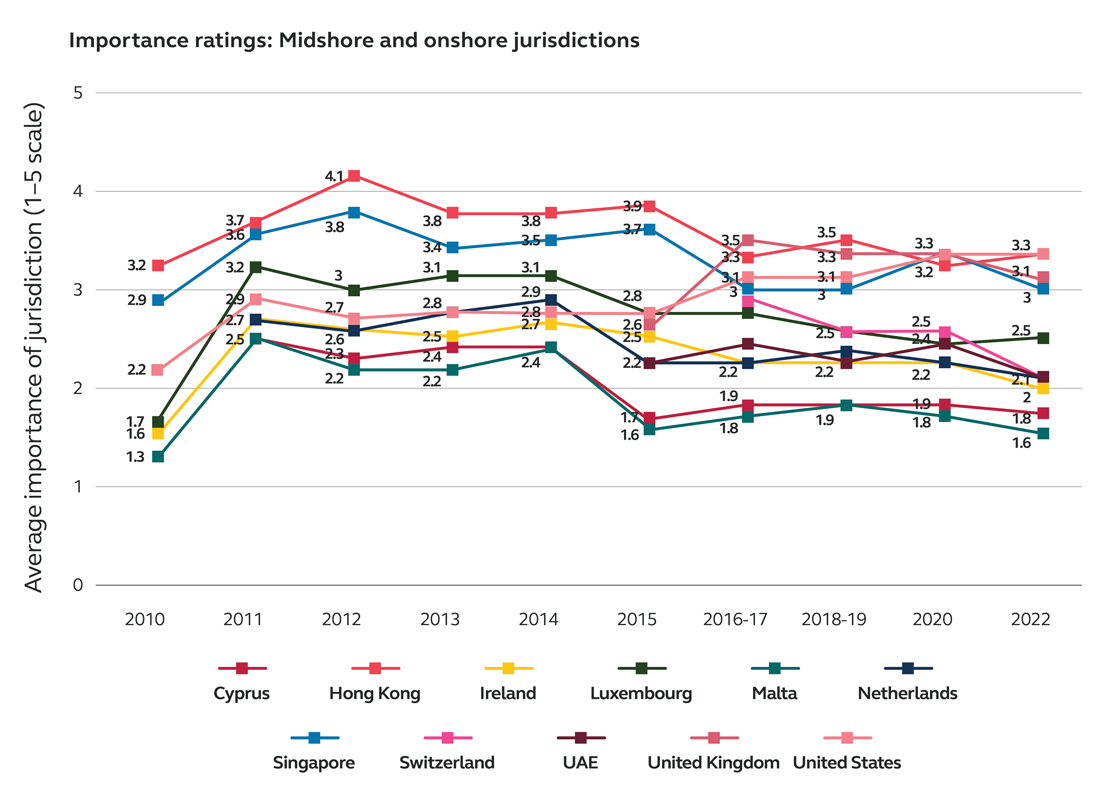As globalisation evolves, businesses stick with tried-and-tested jurisdictions

To meet the new challenges, fund, corporate, capital markets and private wealth market participants are adapting their strategies and operations and demanding new services, including those related to organisational optimisation and lowering regulatory risk. Many organisations are also diversifying their supply chains and their assets. In some cases, they’re targeting new jurisdictions for outward investment. For example, OECD figures for 2022 show that foreign direct investment inflows to China and the US were down 48 and 21 percent respectively, while Australia and Sweden were up 159 and 134 percent respectively. It’s important to keep in mind, however, that global FDI flows dropped 24 percent overall in 2022, and that the US and China remained the top two FDI targets.
Since the inception of our Vistra 2030 research series in 2010, we’ve ranked the importance of key jurisdictions in facilitating global business growth. This year’s report, based on a survey of over 600 professionals and 20 in-depth interviews, reveals some new patterns and preferences for financial centres among global businesses operating across borders. But it also cements the notion that stable, trusted jurisdictions continue to stand the test of time and enable global business and investment activities.
Changing perspectives on key jurisdictions.
The US outshines other jurisdictions in our latest rankings, reflecting the consistent inclination of businesses to invest via stable, robust economies.

The US’s light-touch regulatory environment and position as the largest global economy have played in its favour. And the appeal of the US may have increased in part due to its relative political stability in a time of geopolitical turmoil.
In addition, a greater openness may be emerging in the US. A partner at one international law firm told us, “There seems to be an increased interest in getting business from outside its borders, which may not have been the case before. It’s opening up more and more, and it wants to attract talent and projects from outside the US.”
The global race for human capital may also play a part in the US’s appeal. Jurisdictions such as Hong Kong, Singapore, Luxembourg and Cayman Islands play an outsized role in the global financial system, but they’re relatively small and have talent pools to match.
Jonathon Clifton, Vistra’s regional managing director, Asia Pacific, observes, “You've got this conundrum now where global clients want to use well-established but small jurisdictions and there simply isn’t enough talent in those markets to provide the support they’re looking for.”
Examining the data
Offshore jurisdictions have gradually declined in importance over the last decade following increased regulation, including recent economic substance legislation, which appeared to diminish some of the cost advantages associated with the Crown Dependencies and British Overseas Territories.
Yet the British Virgin Islands (BVI) and Cayman Islands have remained largely stable in the rankings and have held steady again this year.

Elsewhere, Singapore, which took the top spot in the 2020 rankings, now sits behind Hong Kong, even as observers debate Hong Kong’s future role as a financial centre in light of China’s tightening political control. Despite these uncertainties, it’s clear that competition between Hong Kong and Singapore will continue.
The UK holds third place in the rankings amid some concerns within the fund and corporate services industry about Brexit’s effects. Meanwhile, Luxembourg and the Netherlands move into the top ten, reflecting their increasing value to businesses and investors looking to conduct activities in the EU.

Consistent flight to quality and established corridors
It’s important to keep in mind that the difference between first, second or third in our rankings is statistically small, and the composition of the top ten centres has remained broadly similar over ten-plus years, with only gradual shifts.
Against a backdrop of regulatory change and global economic uncertainty, this consistency of rankings may indicate that businesses and investors want tried-and-tested jurisdictions through which to transact, whether onshore, offshore or midshore.
The data also underscores the persistence of investment choices by region. Clifton explains: “One of the key lessons we've learned from more than a decade of collecting data is that there are strong, enduring corridors between certain clients within originating markets and their jurisdictions of choice. We know for example that the US institutional fund market has a very strong preference for utilising Cayman for their structures, so that’s a strong, well-established corridor.”
Clifton adds that European alternative investment managers tend to prefer Luxembourg as a jurisdiction of choice, while investment managers and corporations in Asia Pacific tend to use some combination of Hong Kong, Singapore, BVI or Cayman. For anyone looking to invest into the Middle East, UAE structures typically prevail.
“These well-established corridors are supported by a robust professional infrastructure,” Clifton says. “And quite honestly, I don't see any major disruption happening across each of these corridors for the foreseeable future.”
For more information on our jurisdiction rankings and how businesses and investors are adapting to our changing global economy, read our report Vistra 2030: Preparing for a new era of globalisation.
The contents of this article are intended for informational purposes only. The article should not be relied on as legal or other professional advice. Neither Vistra Group Holding S.A. nor any of its group companies, subsidiaries or affiliates accept responsibility for any loss occasioned by actions taken or refrained from as a result of reading or otherwise consuming this article. For details, read our Legal and Regulatory notice at: https://www.vistra.com/notices . Copyright © 2024 by Vistra Group Holdings SA. All Rights Reserved.


